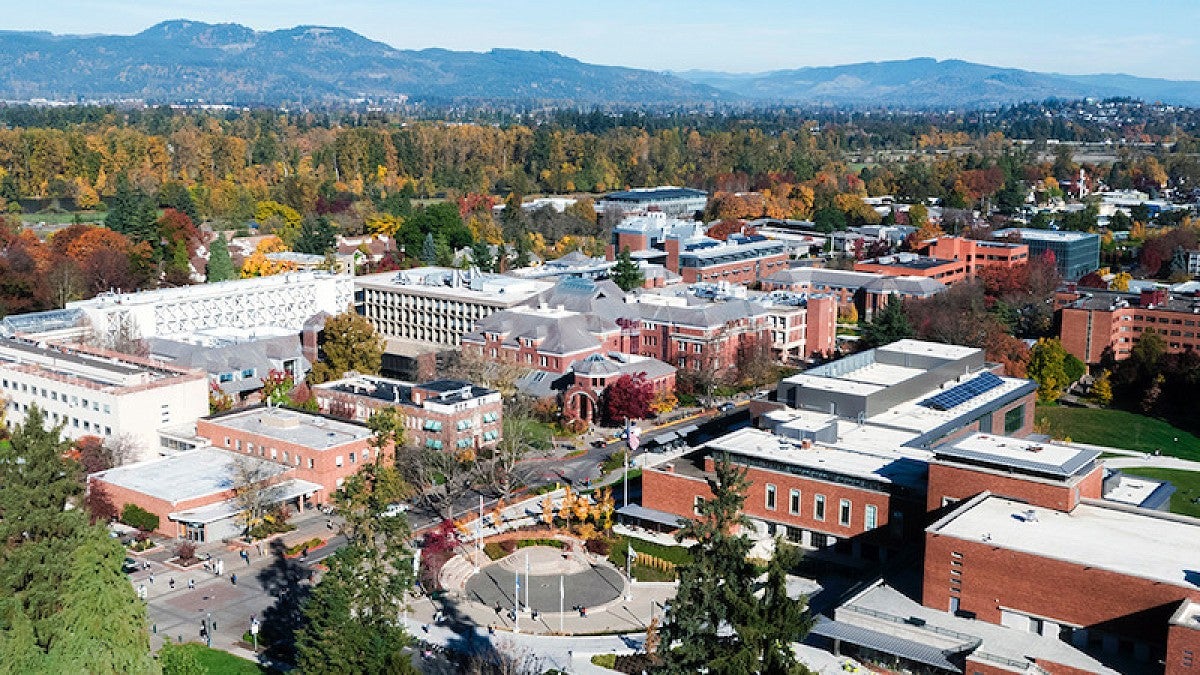The University of Oregon promoted 95 faculty members in 2021, including 53 tenure-track and 42 career faculty members from across the university’s schools and colleges.
“The foundation of a great university is its faculty,” said Patrick Phillips, provost and senior vice president. “The UO's ability to fulfill our mission, to serve our students, to discover and disseminate new knowledge, and to make a lasting impact on society depends on the faculty's scholarship and teaching. This year's promotion and tenure cases provide further evidence for a long-recognized truth: UO's faculty is world class. It is therefore a pleasure to recognize and celebrate the excellence of these newly promoted faculty.”
A list of all promoted faculty members is available online.
Promoted faculty members from across campus acknowledged the role of the university, their colleagues and students in helping them become great educators. Career faculty members in the Lundquist College of Business and the College of Arts and Sciences said professional development opportunities offered by the UO have helped improve their teaching.
“I’ve been given multiple opportunities by Dean Sarah Nutter and my department head, Anne Parmigiani, to design and lead new classes and to expand my teaching portfolio through professional development and a sabbatical,” said Jeffrey Stolle, a senior instructor of management.
“UO encourages and supports innovative, impactful teaching practices through the Teaching Engagement Program, Teaching Academy and Communities for Accelerating the Impact of Teaching,” said Peg Boulay, senior instructor in the Environmental Studies Program. “I have gained inspiration and ideas through these caring communities of people who are passionate about effective teaching.”
Professor of design Tannaz Farsi said she’s found a supportive intellectual community in her department, as well as the UO’s Center for the Study of Women in Society, and solidarity in through its Women of Color project. Her work has also benefited from various opportunities for funding.
“Significant grants from the dean’s office, research funding and a course release from the Creative Arts and Humanities Fellowship as well as funding from the provost’s office have been critical in supporting my research, travel and the production of my work,” Farsi said.
Professor Qusheng Jin received funding from the Office of the Vice President for Research and Innovation at a critical time, early in his tenure track.
“With the fund, I was able to work out publishable preliminary data, obtained funding from the National Science Foundation, and finally published a paper on groundwater arsenic contamination in Nature Geoscience,” Jin said. “I will never forget this opportunity from the VPRI office.”
The UO’s greatest asset is its students, said Ilana Umansky, associate professor of education, and one of her greatest professional joys is working with graduate students.
“Graduate students keep me learning new skills, asking new questions and exploring new perspectives,” Umansky said. “As I move into a tenured position, I feel optimistic about the future because I have the chance to get to know the incredible individuals who will be leading research, practice and innovation in the near future.”
Nichole Kelly, another College of Education associate professor of counseling psychology, expressed gratitude to her mentors among UO’s faculty, whose work she admires for its broad community impact.
“As a first-generation college student and woman in academia, I’ve greatly benefited from the mentorship of the university’s women in leadership, particularly Beth Stormshak and Leslie Leve,” Kelly said. “On numerous occasions, they have taken time out of their very busy days to offer their thoughts and advice.”
This year’s promoted faculty members were particularly impressive, said College of Education Dean Randy Kamphaus.
“I congratulate our faculty, who distinguished themselves by far exceeding any minimum promotion standards for teaching, research, and service excellence,” Kamphaus said. “We have hired many new faculty in recent years who are now providing solutions for youth health promotion, education policy, bilingual education, and other areas in need of leadership. The future of our children and youth, college, and university is very promising.”


